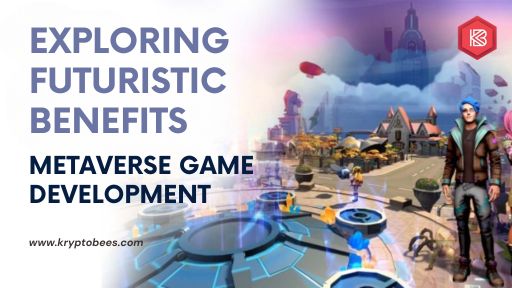In the ever-evolving landscape of technology, a revolutionary concept has taken center stage, captivating the imagination of tech enthusiasts and gamers alike — the Metaverse. As we stand on the brink of a new era, the convergence of virtual reality, augmented reality, and immersive online experiences is giving rise to a groundbreaking phenomenon: Metaverse Game Development. Let’s delve into the futuristic benefits that this emerging frontier holds for both developers and players.
Immersive Gaming Experience: Beyond Reality
In the Metaverse, the boundaries between the physical and digital worlds blur, offering gamers an unparalleled level of immersion. Metaverse games transport players into expansive, lifelike environments where they can interact with the virtual world in ways previously unimaginable. From realistic physics to dynamic ecosystems, the immersive experience transcends the limits of traditional gaming, creating an entirely new dimension of play.
Decentralized Economies and In-Game Assets: Play to Earn
Metaverse games introduce the concept of decentralized economies powered by blockchain technology. Players can truly own in-game assets, from virtual real estate to unique digital items, and even currency. This "Play to Earn" model empowers gamers to monetize their skills and investments, creating a virtual marketplace where the virtual and real economies intersect.
Collaborative Creativity: Building Worlds Together
Metaverse game development fosters a sense of collaborative creativity, allowing players to actively participate in the evolution of the virtual world. User-generated content becomes a driving force, enabling players to shape the narrative, design virtual landscapes, and contribute to the overall gaming experience. This dynamic interaction between developers and players blurs the lines of traditional game development, creating a truly co-authored virtual universe.
Cross-Platform Integration: Seamless Connectivity
The Metaverse is not confined to a single platform; it transcends devices and operating systems. Metaverse games seamlessly integrate across various platforms, enabling players to transition from virtual reality headsets to augmented reality glasses or even traditional screens without losing continuity. This cross-platform integration enhances accessibility, fostering a unified gaming experience for players regardless of their chosen device
.
Social Connectivity: Beyond the Screen
Metaverse games redefine social interaction by transcending the limitations of traditional online gaming. Players can engage in real-time communication, form alliances, and embark on quests with friends in a truly immersive virtual space. The Metaverse becomes a hub for social connectivity, offering a digital space where relationships are forged, events are attended, and experiences are shared.
AI-Powered Dynamic Storytelling: Personalized Adventures
Metaverse game development leverages artificial intelligence to craft dynamic and personalized storytelling experiences. AI algorithms adapt the game narrative based on individual player choices, creating a unique and tailored adventure for each participant. This level of personalization enhances player engagement and ensures that no two journeys through the Metaverse are the same.
Conclusion:
As we venture into the uncharted territory of Metaverse game development, the potential for innovation and transformation within the gaming industry is nothing short of extraordinary. The fusion of cutting-edge technologies, decentralized economies, and collaborative creativity heralds a new era of gaming, where the virtual realm becomes an extension of our reality. As developers and players alike embrace the limitless possibilities of the Metaverse, the journey into this futuristic frontier promises to be an exhilarating and groundbreaking experience. Welcome to the next level of gaming – welcome to the Metaverse.





Comments